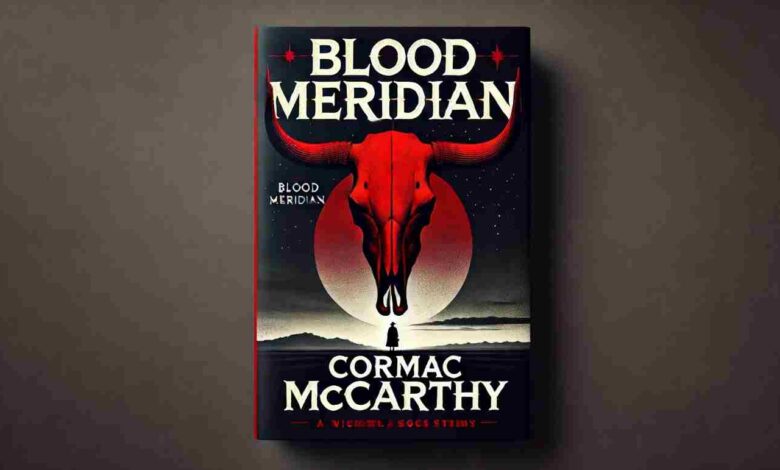Blood Meridian or The Evening Redness in the West: Whats New

Cormac McCarthy’s Blood Meridian or The Evening Redness in the West is an epic novel that takes readers deep into the violent heart of America’s westward expansion. Published in 1985, the novel is often regarded as one of McCarthy’s greatest works, and it remains one of the most challenging and unsettling reads in American literature. McCarthy presents a brutal landscape where violence, chaos, and death reign supreme, all told through a prose style that is both poetic and stark.
A Harrowing Journey Across a Violent Frontier
The Kid is the central character of Blood Meridian, yet we never actually know his name (he’s called “the Kid”), and he leaves Tennessee for Texas when fourteen. He is soon swept up by a party of scalp-hunters, led by the enigmatic Captain Glanton and Judge Holden: two of the most chilling figures to stride along that lawless and so-despicable edge between worlds.
Set in the expansive American Southwest, and Northern Mexico as The Kid travels these arid lands on a fundamental yet no less retributive mission, this novel becomes not only an imaginative puzzle of ghosts or murders that must be solved to bring peace but also a shaded world where livings are near-fatalistic and cruelty had become human nature.
Blood Meridian is a fictionalized telling of events that allegedly occurred from the mid 19th century with particular attention to historical accuracy within the Glanton gang’s scalp-hunting expeditions aimed at various targeting Native Americans and other groups, McCarthy’s story depicts a grim and nearly nihilistic image of man, claiming that violence is innate to the human species. All of this seems a matter of course, as the violence is both inexplicable and unsparing—from gruesome bloodbaths to lower-key brutality that highlights how integral killing has become in these people’s lives.
The Role of Judge Holden
Judge Holden, a huge hairless figure enamored of his own intellect (and unmatched in capacity for violence), is one of the most compelling and horrific characters found anywhere in literature. Widely believed to be one of the most mysterious and dark characters in American literature, Judge Holden believes that violent acts are not just ubiquitous but übermenschlichenden expressions of human will. As he famously puts it, “War is God,” meaning that the root of history and humanity themselves lies in violence.
Within the narrative, the Judge functions not simply as an antagonist but also a figure of nearly chemical malignance. It is as though his shadow casts over every act of violence, almost omnipotent and seeming to personify the destruction that McCarthy has built. He is a passive, manipulative presence around everyone in the novel but most dangerously to Kid who deceives himself into believing he has any kind of moral compass throughout. The dichotomous nature of this description highlights the Judge’s philosophical considerations on both life and light, war and more: a chilling reflection daily reinforced by his belief in human failure to provide order amid inherent chaos.
Themes of Violence and Fate
Blood Meridian by McCarthy is full of themes that force you to come face-to-face with uncomfortable bits about human life. Fate vs free will is one of the core dilemmas in this novel. Though the Kid struggles to hold onto his autonomy throughout, it is infrequently swallowed up by everything swirling around him. In the Judge and others, it seems that fate (or violence) determines how one’s life will go, so everyone is doomed to try in vain.
The title of the book, Blood Meridian or The Evening Redness in the West, seems to carry with it a sense that violence is something that cannot be avoided. The “evening redness” are the blood-red sunsets that marked, and remind us of, death as a norm in this world. Watermark: A line of division or peak When the characters start performing levels of violence they become locked into morally and existentially these are crossed by them as the character plays Watermark.
A Narrative without Redemption
Perhaps the most important feature of Blood Meridian is that no sense of redemption or release is offered. McCarthy gives neither his characters nor the reader any reprieve from the heinous truth that is being told. Though the Kid reveals his human side occasionally, he is unable to break free from the vicious world that comprises his existence. His haunting moral issues and problems with the Judge plague readers with more questions than conclusions, promising no clean conclusion by the novel’s end.
McCarthy uses very simple, yet excruciatingly detailed language that ratchets up the bleakness of the novel. His steadfast refusal to soften the edges or moralize results in a brutal and unyielding portrait of people reduced to their basest selves. The violence is not sensationalized, but it finds a convenient home in nearly every crevice of the story.
Literary Significance and Reception
That book, Blood Meridian, has since become hailed as one of the great American novels. Critics have typically praised McCarthy as a great and original teacher, often referring to him along that tradition of writers who include Herman Melville and William Faulkner. The book’s heavy, poetic style and spiritual content have inspired a variety of interpretations. To a few readers, it is a criticism of Manifest Destiny and American expansionism; to an equal contribution, see The Heart Of Darkness as assisting in the discovery only men are made for evil.
At the same time, Blood Meridian has been criticized for its extreme brutality and traditional character development. Maybe it is corners with which the novel challenges its readership too much: McCarthy writes in a world where hope and redemption do not seem to exist. And yet, it is precisely this very darkness that has helped ensure Blood Meridian endures as a work of literature in spite of the controversy writers and critics alike all but squirmingly bring to bear upon the text.
The Bottom Line
This is a novel of extreme humanity, in every horrific sense that can be taken from the word. McCarthy follows the Kid and his captors to a vision of the American West that stands in stark contrast with romanticized versions depicted by traditional Western stories. The landscape is different and rough, where everything is crueler than ever before, violence plundering everywhere, humans are struggling for their life.
Because of — or perhaps despite — its bleakness, ‘Blood Meridian or The Evening Redness in the West‘ remains an incisive reflection on the nature of violence and morality that can be found in any work. It is a tale that stays with the readers even after they have read it and leaves them to think about what lurks in all of our collective hearts.





